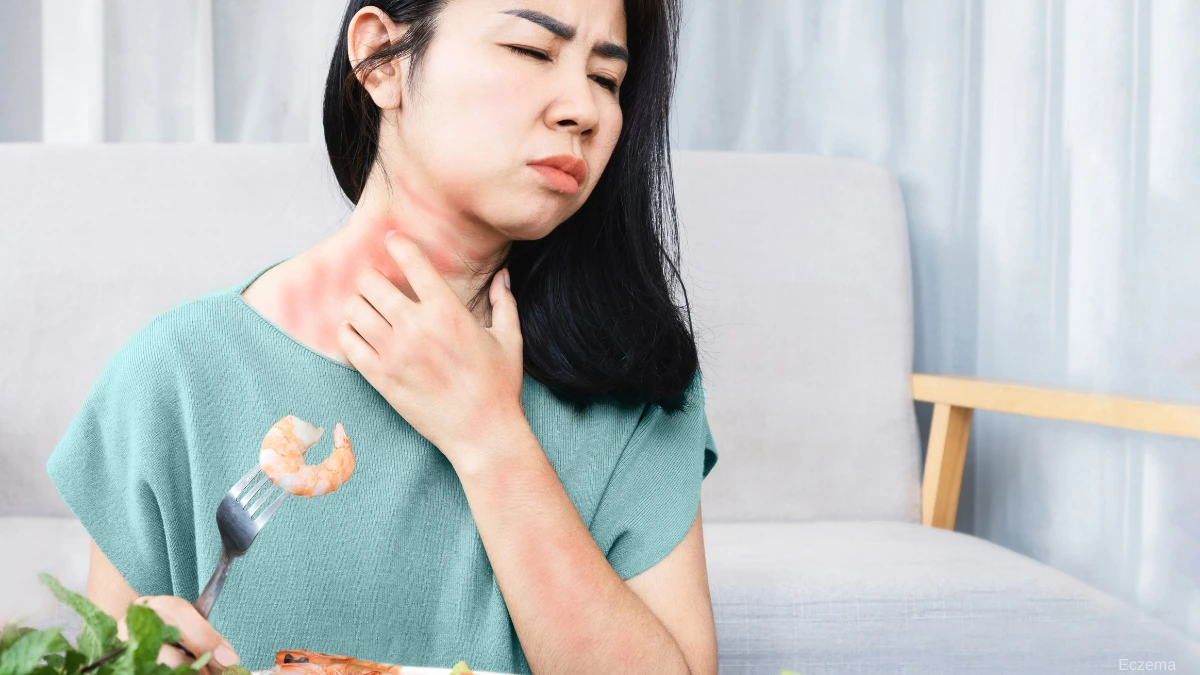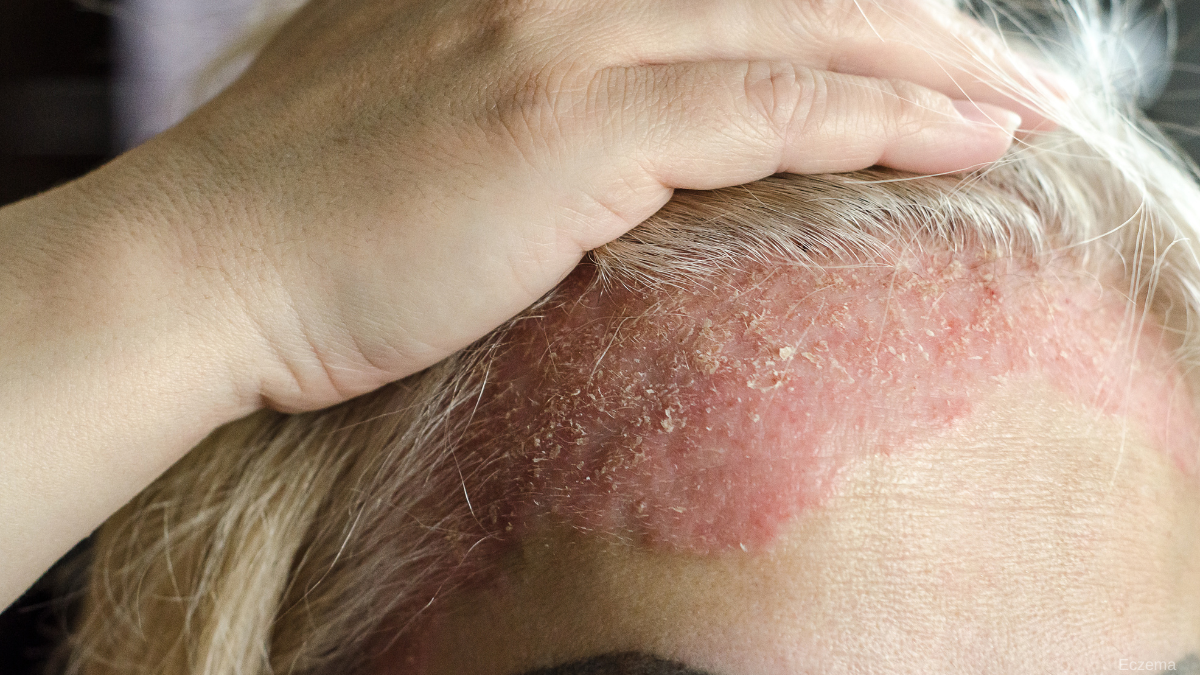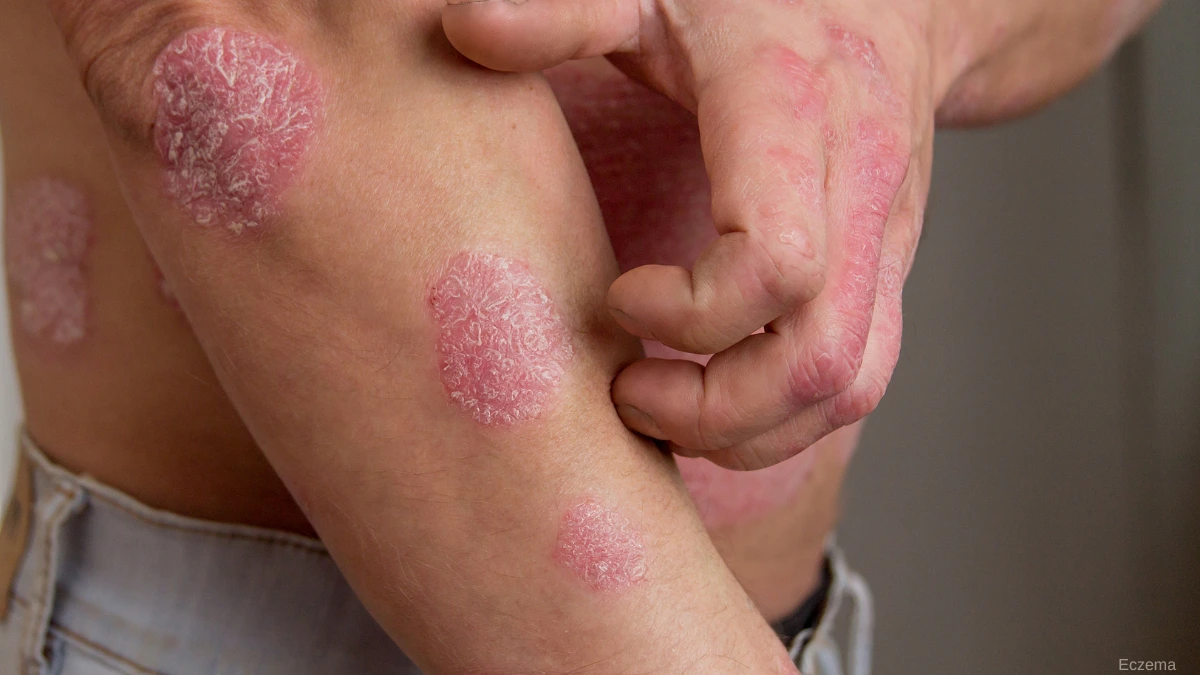Eczema is a skin condition that leads to dry, itchy, and bumpy skin, weakening the skin barriers responsible for retaining moisture and shielding against external elements. It manifests as dryness, red rashes, swelling, and itching on various parts of the body, including the face, hands, neck, elbows, knees, ankles, feet, throat, around the ears, and lips.

This type of skin disease falls under dermatitis, encompassing conditions causing skin inflammation. Eczema is triggered by weather changes and may lead to bleeding from severe itching. It increases the risk of other skin infections, affecting various body parts, including the hands, neck, elbows, knees, ankles, feet, face, especially the throat, around the ears, and lips. It can also appear on the skin of nipples, breasts, vulva, and penis.
Factors contributing to eczema include excessive stress, pollution, contaminated water, and poor eating habits. Allergies to certain foods, use of chemical products, excessive makeup, hormonal changes, and family history can also contribute to the development of eczema.
Eczema: Causes

1. Use of Chemical Substances:
Irritant substances such as soaps, detergents, shampoos, other laundry liquids, bubble baths, etc. can trigger eczema conditions.
2. Environmental Pollution:
Environmental factors such as extreme cold, dry and humid weather can trigger it. Apart from this, dust, dirt, fungus and pet dander also promote this condition.
3. Allergies to Certain Foods:
Food allergies such as cow’s milk, peanuts, wheat flour, soya, egg etc. cause this skin condition as a side effect in some people.
4. Synthetic Fabric:
Fabric allergies such as wool or synthetic clothing can also trigger this skin condition in some people.
5. Hormonal Changes:
Due to hormonal changes during pregnancy, menstruation and menopause, skin infections like eczema are often seen in women.
6. Skin Care Products:
Excessive use of makeup and use of wrong skin care products can also cause this skin condition.
7. Mental Stress:
Your mental health conditions such as emotional anxiety, stress, anxiety, depression, etc. can trigger it.
8. Family History:
If your family or your parents have suffered from eczema and dermatitis, then this problem can trouble you too. This condition can also be transferred genetically.
Eczema: Symptoms

1. Dry and cracked skin.
2. Persistent itching of the skin.
3. Small, raised bumps appear.
4. Oozing and crusting of papules on the skin.
5. Skin feeling thicker than normal.
6. Darkening of the skin around the eyes.
7. Easy removal of upper layer of skin due to itching.
8. Swelling of the skin and a rash (the color of the rash may vary depending on your skin color).
Eczema: Diagnosis
If you are noticing symptoms of eczema and they are increasing day by day, then you need to visit a health care expert. Most people suffering from it are also at risk of other types of skin infections. In such a situation, the doctor conducts some skin tests to diagnose it and may ask some skin related questions. They recommend effective treatments for the problem after measuring your skin condition.
Eczema: Treatment

1. Use moisturizer:
If your skin is dry, use a mild and sensitive skin moisturizer in case of eczema four to five times throughout the day. Applying moisturizer on slightly wet skin after bathing will help.
2. Medication:
Do not skip the medication suggested by the doctor. There are many topical medications that it is important to apply to your skin regularly until the condition improves. Especially the use of topical steroids provides relief.
3. Anti-inflammatory medicine:
In case of this skin condition, there is a feeling of excessive itching and swelling on the skin. In such a situation, the condition can improve by taking oral medicines recommended by the doctor such as anti-inflammatory medicines, antihistamines and corticosteroids.
4. Light Therapy:
Many times doctors recommend light therapy in case of this skin condition. It improves the appearance of your skin and also helps in removing visible blemishes on the skin.
5. Avoid triggers:
Eczema triggers may vary from person to person, so identify your triggers and try to avoid them completely. Failure to do so may trigger it’s symptoms again and again.
2 Effective Remedies to Reduce Eczema

1. Do Cold Compress:
When eczema occurs, there is severe itching in the skin. In such a situation, you should apply fomentation with something cold. You will feel relieved by this.
- Soak a slightly thick cloth in ice cold water.
- Apply it on the effected area.
- Keep it like this for 10-15 minutes.
- Then replace it again.
2. Cold Pressed Coconut Oil and Rock Salt:
- Mix a little rock salt in 1 teaspoon coconut oil.
- Apply it slowly on eczema skin.
Coconut oil is anti-inflammatory and anti-bacterial. This provides relief from itching and burning caused by eczema. Additionally, the moisturizing properties of coconut oil retain moisture, thereby preventing dryness of the skin. Additionally, coconut oil contains lauric acid. It reduces the dirty bacteria, fungus and virus present in the skin.
Rock salt provides relief to people suffering from this condition, as it is hydrating and anti-inflammatory. Also, this salt contains many minerals like magnesium, calcium and potassium, which are good for the skin. These minerals work together to hydrate the skin and reduce inflammation. Using it on the skin reduces itching, redness and dryness.
Caution:
- While doing this remedy, you have to take care not to rub it, because it can cause damage to the skin.
- Avoid eating gluten and dairy products until the condition improves.
Diet for Eczema

- Some changes in diet can help you in reducing eczema/psoriasis.
- Cook your food in pure coconut oil. It is rich in fatty acids, which reduce inflammation caused by eczema.
- Reduce caffeine intake, as it destroys skin-protecting vitamins B.
- Raw fruits and vegetables act as natural detoxifiers. Therefore consume it as much as possible.
- Carrots and boiled spinach flush out toxins from the liver and other parts of the body. Therefore include it in your diet.
- Among fruits, melon and blackberries work wonders in eczema.
- Sprouts also soothe the itching caused by eczema. Therefore, include it in breakfast.
- To improve Vitamin D levels, sit in the sun for some time every day. This increases immunity and improves eczema.
Pay attention:
If your eczema is in serious condition, contact a doctor.

